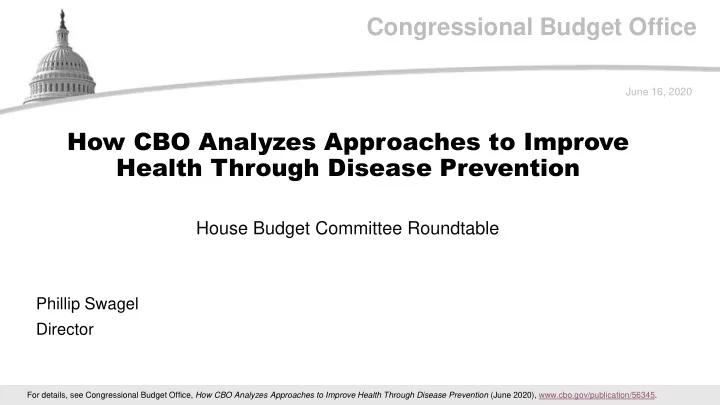

Congressional Budget Office June 16, 2020 How CBO Analyzes Approaches to Improve Health Through Disease Prevention House Budget Committee Roundtable Phillip Swagel Director For details, see Congressional Budget Office, How CBO Analyzes Approaches to Improve Health Through Disease Prevention (June 2020), www.cbo.gov/publication/56345.
CBO Expanded Use of Many Preventive Medical Services Has Improved Health and Increased Health Care Costs The use of preventive medical services can, and often does, improve people’s health. A comprehensive review of the research literature conducted in 2008 found that most preventive medical services improved health but that about 80 percent of them led to higher health care spending overall. A 2014 study by the Government Accountability Office supported the findings of the 2008 review. 1
CBO Preventive Medical Services Can Increase or Decrease Health Care Spending Savings come from only a subset of people who receive the services — from preventing diseases or identifying and treating them early on. Even when the price of a particular service is low, costs can accumulate when many people receive it. Services can have unintended costs (adverse reactions to vaccinations and false positives from screenings, for example). Services may increase patient longevity, resulting in people living longer and potentially incurring treatment costs for other medical conditions. 2
CBO Effects on the Federal Budget May Differ From Effects on Overall Health Care Spending The effects on the federal budget are often smaller than the effects on total health care spending because the federal government does not pay for all health care. Some people may already be receiving the service; for them, additional federal support might shift costs to the government without improving health. Savings may not fully emerge within the 10-year budget period. Improved patient longevity can increase federal outlays. 3
CBO CBO Analyzes the Effects of Legislative Proposals to Expand Preventive Medical Services on a Case-by-Case Basis CBO estimated that covering tobacco cessation services for pregnant women under Medicaid would reduce federal spending for that program. CBO estimated that expanding Medicare’s benefit package to waive cost sharing for the “Welcome to Medicare” visit and include a new annual wellness visit with no cost sharing would increase federal spending for that program. 4
CBO The Effects of a Coronavirus Vaccine on the Federal Budget Could Be Substantial But Are Very Uncertain A vaccine for the coronavirus has not yet been approved and made widely available. CBO anticipates that if and when that happens, the effects on the federal budget could be substantial and would depend on many factors. Legislation related to a vaccine for the coronavirus differs from proposals involving most other preventive medical services in that it could have major macroeconomic effects, such as a faster rebound of economic activity and increases in tax revenues. The size of such effects would depend on many factors. By long-standing convention, such effects generally are not reflected in CBO’s cost estimates. 5
Recommend
More recommend